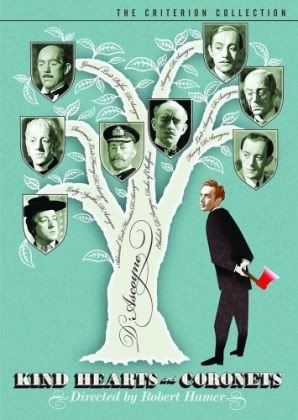Before there was
Tyler Perry, there was
Eddie Murphy doing multiple parts in one movie. And before Eddie Murphy, there was
Peter Sellers. But before Peter Sellers, there was...
Alec Guiness
From The A.V. Club: If the Ealing Studios classic Kind Hearts And Coronets isn't the blackest of black comedies, then it may well be the driest: It's loaded with devastating slights dropped into the most formal of British sentences. It's the story of a commoner who murders his way to the dukedom, all while comporting himself in such a gentlemanly fashion that it feels like he's merely ushering his rivals gently to their fate. This cognitive dissonance comes into play when he goes out bird-hunting with his next victim, but refuses to carry a shotgun, claiming that "my principles will not allow me to take a direct part in blood sports." The screenplay bristles with such sharp little ironies, but Kind Hearts remains memorable less for its caustic dialogue than for the cold-blooded matter-of-factness in which it's delivered.
While carrying out a diabolical revenge scheme, Dennis Price keeps a gentleman's countenance at all times, and his darker thoughts are mostly relegated to the voiceover narration. Though connected by blood to the aristocratic D'Ascoyne family, Price's mother was exiled from her birthright after marrying a peasant for love. After her death, Price vows to avenge her by ascending to the dukedom. In order to make this happen, he first has to get through the eight D'Ascoynes ahead of him on the family tree, so he quietly facilitates their deaths, using such means as poisoning, an explosive jar of caviar, and an arrow through a hot-air balloon.
All the D'Ascoynes are played by Ealing's prize star Alec Guinness, including Lady Agatha, a rather broad-shouldered women's-rights activist.
As Philip Kemp's liner notes reveal, Kind Hearts And Coronets couldn't be further from Ealing's tradition of folksy, light-hearted comedies, and for that reason, it was treated coolly by the studio and American censors, who forced the filmmakers to tack on a thuddingly literal ending. Even still, the film proves just how little the production code could do to keep sinful content from the screen so long as it played by the rules; its scenes of sinister deviance and eroticism follow the letter of the code while ignoring its intent. For that and other reasons, it served as the model for all black comedies that followed.
http://www.avclub.com/content/node/46282




